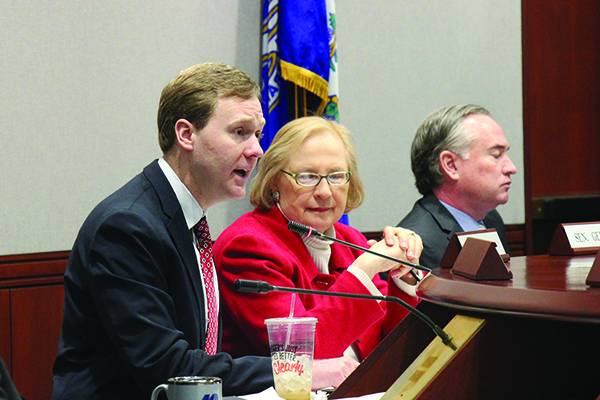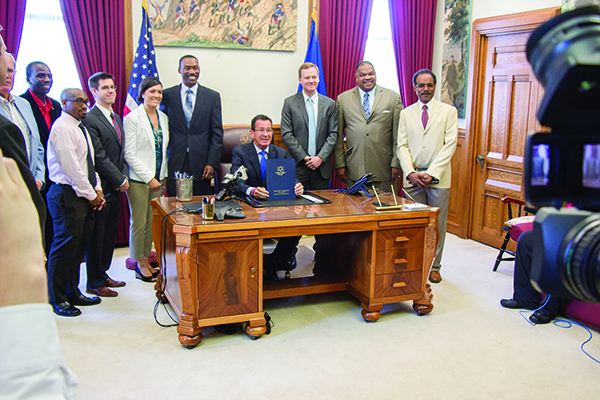
STATE REPRESENTATIVE
Matthew Ritter

Serving the 1st Assembly District
Legislative Office Building, Room 4003
Hartford, CT 06106-1591
Capitol: 800-842-8267
Matthew.Ritter@cga.ct.gov
REGULATING VARIABLE ELECTRIC RATES
This year, the state legislature took a historic step in protecting Connecticut residents, particularly the elderly, from electricity providers who offered a very low introductory variable rate to electricity customers, only to rapidly increase those rates upon the completion of the initial contract. Starting in October, retail electric suppliers can no longer enter into variable rate contracts with customers or automatically renew those contracts. Electric providers must also conform with existing laws that require proper notification to go out to their customers who have contracts expiring.
The Public Utilities Regulatory Authority (PURA) will begin to develop recommendations in regards to how electric customers should be treated upon the completion of their contracts, when they have not signed up for a new one. This will include information on what type of month-to-month rate suppliers can fairly charge a customer. This legislation will help ratepayers see a reduction in their bills while keeping them better informed.
(PA 15-90) Effective Date: October 1, 2015
PREVENTING SUBSTANCE ABUSE AND OPIOID OVERDOSE
According to 2013 data from the Centers for Disease Control and Prevention, more than half the drug overdose deaths in the United States were related to pharmaceutical drugs. To help combat this public health problem, as Co-Chair of the Public Health Committee, I helped to pass legislation requiring prescribers (physicians, physician assistants, APRNs and dentists) to be trained in how to properly prescribe controlled substances. If prescribing more than a 72-hour supply of any controlled substance, the practitioner must check the patient's record in the prescription drug-monitoring program, and report those prescriptions to the program immediately. Pharmacists will also be allowed to prescribe opioid antagonists, used to treat drug overdoses, if they receive special training and certification to do so.
(PA 15-198) Effective Date: October 1, 2015
ESTABLISHING A BILL OF RIGHTS FOR RESIDENTS OF CONTINUING-CARE RETIREMENT COMMUNITIES
According to 2013 data from the Centers for Disease Control and Prevention, more than half the drug overdose deaths in the United States were related to pharmaceutical drugs. To help combat this public health problem, as Co-Chair of the Public Health Committee, I helped to pass legislation requiring prescribers (physicians, physician assistants, APRNs and dentists) to be trained in how to properly prescribe controlled substances. If prescribing more than a 72-hour supply of any controlled substance, the practitioner must check the patient's record in the prescription drug-monitoring program, and report those prescriptions to the program immediately. Pharmacists will also be allowed to prescribe opioid antagonists, used to treat drug overdoses, if they receive special training and certification to do so.
(PA 15-198) Effective Date: October 1, 2015

Rep. Matt Ritter was honored to give citations to seniors who volunteer
in the West End and Asylum Hill communities.
HELPING SMALL BUSINESSES
This year we allocated more funds for the highly successful Small Business Express Program. We are also requiring the Department of Economic and Community Development to dedicate funds to develop a program for construction projects for minority business enterprises. These measures will create jobs and improve economic opportunities for Connecticut families.
(SS PA 15-5) Effective Date: July 1, 2015
HEALTH INSURANCE COVERAGE FOR MENTAL OR
NERVOUS CONDITIONS
Several recent reports have identified a gap between publicly funded mental health services and those covered by the private insurance market. This year we required certain services be covered by private health insurance plans, including mental health and substance use screenings, crisis stabilization services, inpatient and outpatient hospital and residential care, home-based services, and programs to improve outcomes for children and families.
(PA 15-226) Effective Date: January 1, 2016

Rep. Matt Ritter speaking at a Public Health Committee meeting.
A SECOND CHANCE SOCIETY
For years, Connecticut’s drug policies have swelled our prisons with nonviolent drug offenders who struggle to reintegrate into society upon release. “A Second Chance Society” will reverse these policies largely by reducing jail time for such offenders. Penalties for possession of small amounts of illegal drugs will be reduced from a felony to a Class A misdemeanor and a drug-dependent offender may complete a substance abuse treatment program on a second offense. During probation, the offender must perform community service. We also ensured victims are notified of a parole hearing and have access to the inmate’s complete file prior to the hearing. The expedited pardon review process for nonviolent crimes will also be streamlined; now offenders must receive a “pardon eligibility notice.” These provisions will give ex-offenders a better chance to get back into the workforce – and also save millions in taxpayer dollars.
(SS PA 15-2) Effective Date: October 1, 2015
BEEFING UP STUDENTS’ FINANCIAL LITERACY EDUCATION
To make sure high school and college students are prepared to manage their personal finances and understand the importance of maintaining a good credit score, new legislation broadens the curriculum topics that must be developed by the Department of Education, Board of Regents, and the UConn Board of Trustees. The curriculum must include the topics of banking, investing, savings, and the handling of personal finances.
(PA 15-138) Effective Date: October 1, 2015

Rep. Matt Ritter met with constituents from CRT’s Thomas D. Ritter Early Care
and Education Center which is named after Matt’s father.
IMPROVING COMMUNITY POLICING
I sponsored legislation which will improve community policing and hopefully reduce unnecessary interactions between police officers and residents. A lot of publicity occurred over an incident this past winter in which a police officer from a neighboring town crossed into Hartford and questioned a resident for shoveling his own driveway. The bill passed by the legislature prohibits a municipal police officer from crossing town lines simply to enforce a local ordinance. When police officers from another town come into Hartford, they do not know the residents or neighborhoods and it only increases the likelihood of a bad interaction. I was proud to stand with dozens of Hartford residents who testified in favor of this legislation.
(PA 15-83) Effective Date: October 1, 2015

Rep. Matt Ritter joins Governor Malloy, Doug and Tiffany Glanville and other
community leaders at the bill signing.
